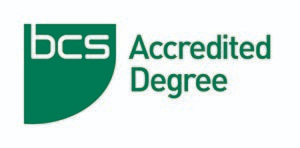
Cyber Security, Threat Intelligence and Forensics
Full-time
Part-time
One year
Three year
September 2026
In a nutshell
Data security breaches are on the rise, but you can be part of the solution. With our Cyber Security, Threat Intelligence and Forensics postgraduate degree, you can expand your existing computing knowledge, and develop an applied skill set, ready to build a career in this exciting, in-demand intelligence field.
Available with full and part-time study routes starting each January and September, this Chartered Institute for IT (BCS) accredited course will provide you with both a specialist cyber security knowledge base and real-world skills, so you are ready to fight cyber crime.
During your studies, you will learn about attack (red team) and defence (blue team) strategies. You will consider established attack surfaces (networking, social engineering) and modern issues (IoT, Cloud). You will examine the trade-offs taken between security, privacy and availability.
International applicant? Please check international intakes for the latest information and application dates.
Start your MSc Cyber Security, Threat Intelligence and Forensics study journey
Register for our next Open Day where you can learn more about the course, tour our impressive new computing suites and meet the tutors
You will:
- Develop practical and real-world skills in all major areas of cyber security
- Engage with industry experts and active cyber security researchers during your studies
- Build cyber threat intelligence to learn how to fight against Advanced Persistent Threats (APTs)
- Gain advanced knowledge of penetration testing, cyber forensics, malware reverse engineering, privacy, and risk management
students accepted
Course accreditations

This is for you if...
You're a computing graduate keen to build a career in cyber security management
You have a curious mind and want to learn how criminals infiltrate data networks
You want to use your programming and networking skills to learn how to combat cyber attacks
All about the course
Course delivery
Our Cyber Security, Threat Intelligence and Forensics postgraduate degree course is delivered through a range of highly-focused modules. The 180-credit MSc award comprises four taught modules, plus a research dissertation. The 120-credit PgDip award comprises four taught modules.
Flexibility is at the heart of our learning approach. You can choose to study this postgraduate course full-time or part-time on campus, with start dates in January and September:
- Full-time students will complete taught modules in each of the first two trimesters, and complete the 60-credit dissertation project in trimester three
- Part-time students will complete taught modules in years one and two, and complete the dissertation project in year three
The course timetable is designed to allow students with other commitments to structure their week around teaching sessions.
Learning experience
Our course explores cyber security from both attack and defense (red and blue issues) positions, so you can develop comprehensive subject knowledge. We regularly review module content with our industry partners to ensure your acquired knowledge and skillset reflects trends and needs within professional and business communities.
Current course topics include cyber forensics, information security, privacy and network security and threat intelligence. Knowledge is delivered using activities that will sharpen your computer science skills, and help you to develop both a strategic mindset and an analytical approach. Learn more about the current course modules in the section below.
Course team
The Cyber Security, Threat Intelligence and Forensics postgraduate course is delivered by an academic team with extensive industry experience and research connections.
Course leader: Dr Lee Speakman
Cyber Forensics
You will develop the skills, methodologies and processes to conduct in-depth computer and network investigation, also looking at emerging platforms such as cloud and Internet of Things. You will also consider legal and ethical aspects of cyber investigation.
Information Security in Practice
You will study threats to information security, technologies used to assess and control risks, and learn about the techniques and tools used to manage and investigate incidents. Attack and defense (red and blue issues) are studied together to highlight that information security has considerable broader scope than cyber security.
Privacy and Network Security
You will study how the applied use of cryptography can provide enhanced security for networked systems (including emerging systems such as blockchain, cloud and IoT), and enhanced privacy for users of networked systems (including social networks and vehicular networks) but that all design decisions are subject to multiple trade-offs that balance the different needs of diverse views of the systems.
Cyber Threat Intelligence
You will study techniques for detecting, responding to and defeating organised cyber crimes and cyber war activities, analysing successful and unsuccessful advanced persistent threats and malware campaigns. You will also cover malware analysis and reversing techniques.
Project
You will work under the direction of an academic supervisor to research a suitable problem, and to develop and evaluate a solution that demonstrates originality in the application of your knowledge.
We take a flexible approach to our course delivery that promotes diversity and inclusivity and provides a blended learning experience, which will vary to meet specific programme requirements. This learning time includes formal lectures and interactive activities such as seminars, tutorials, practical sessions, laboratory and studio learning. Smaller classes may be used to support collaborative activities such as project and group work and presentations. A range of different assessments and feedback is offered to meet the needs of both our diverse student body and specific subject needs.
Our postgraduate taught courses are normally made up of 30 credit modules which are equal to 300 hours of learning time, or 15 credit modules which are equal to 150 hours of learning time. A Master’s degree typically comprises 180 credits, a PGDip 120 credits, and a PGCert 60 credits.
Please note that exact modules and content offered may vary in order to keep content current and, for courses that offer optional modules, may depend on the number of students selecting particular options. When accepting your offer of a place to study on a programme with optional modules, you should be aware that optional modules may not all run each year. Your tutor will be able to advise you as to the available options on or before the start of the programme. Whilst the University tries to ensure that you can undertake your preferred options, it cannot guarantee this.
School of Science, Engineering and Environment
Rising to the challenge of a changing world, our postgraduate courses are designed to shape the next generation of urbanists, scientists, engineers, consultants and leaders.
Shaped by industry, and delivered by supportive programme teams, you can develop the skills to take your career potential further.
Learning environment
As a cyber security student, you will use computing suites equipped with specialist software required for exploring database systems, networking and network simulation, internet security, and computer forensics.
Industry collaboration and research
When you start this degree course with Salford, you are joining a community making a difference in industry, our local region and in our wider society.
Many of our academics and technicians who support your course also lead collaborative, interdisciplinary, high-impact work in a range of local and global computing and informatics issues and challenges.
Discover how you are part of something bigger.
What about after uni?
EMPLOYMENT
There is a significant worldwide skills shortage in this area, particularly for graduates with the in-depth cyber security technical knowledge. Our course is designed to provide a recognised qualification for graduates and professionals looking to develop a computer science-based skillset. By drawing on our industry knowledge and partnerships, the course provides you with a platform for future career success in cyber security management.
As a cyber security graduate, you will be ready to apply for a range of technical security-based roles within business, banking, software, networking, government, consultancy, etc. Typical roles could include malware analyser, penetration tester, information security manager, security consultant or security programmer.
FURTHER STUDY
You might also choose to take your subject interest further with postgraduate research. The Salford Innovation and Research Centre (SIRC) is home to Informatics PhD and Research Master’s opportunities in knowledge discovery and semantic web, software engineering, big data, data mining and analytics, cyber security, information visualisation and virtual environments.
Explore our Doctoral School to learn more about research training, support and opportunities.
Career Links
We lead an industrial liaison committee to gain advice on our computing programmes and course content. Companies involved in this initiative rely on IT and data for their operations. Our approach ensures that we understand industry needs from multiple perspectives and helps us to nurture graduates with strong employability and transferable skill sets.
This course has contacts with local industry such as software companies (such as Web Applications UK), infrastructure providers (such as UKFast) and security consultants (such as KPMG). These companies will provide you with a real-world perspective to help you appreciate the barriers that exist and the compromises that must be made to manage conflicting demands (known as the C-I-A triad).
What you need to know
ENGLISH LANGUAGE REQUIREMENTS
All of our courses are taught and assessed in English. If English is not your first language, you must meet our minimum English language entry requirements. An IELTS score of 6.0 (no element below 5.5) is proof of this, and we also accept a range of equivalent qualifications.
Read more about our English language requirements, including information about pathways that can help you gain entry on to our degree courses. If you do not have the English language requirements, you could take our Pre-Sessional English course.
INTERNATIONAL APPLICATIONS
Please check international intakes for the latest information and application dates.
PROFESSIONAL ACCREDITATION
This degree is accredited by BCS, the Chartered Institute for IT. An accredited degree provides a valuable contribution towards professional membership and evidencing breadth of knowledge. Some employers give preference to applicants who have accredited degrees, and an accredited degree is likely to be recognised by other countries that are signatories to international accords.
Undergraduate degree
The minimum entry requirement is a 2.2 honours in computer science, or a related subject with coverage of programming and IPv4 networking, preferably with experience of command line usage.
International student entry requirements
We accept qualifications from all around the world. Find your country to see a full list of entry requirements.
Accreditation of Prior Learning (APL)
We welcome applications from students who may not have formal/traditional entry criteria but who have relevant experience or the ability to pursue the course successfully.
The Accreditation of Prior Learning (APL) process could help you to make your work and life experience count. The APL process can be used for entry onto courses or to give you exemptions from parts of your course.
Two forms of APL may be used for entry: the Accreditation of Prior Certificated Learning (APCL) or the Accreditation of Prior Experiential Learning (APEL).
For more information or enquires about this scheme, please contact: AdmissionsSEE-PGT@salford.ac.uk
How much?
For students beginning their studies in January 2026, please see fees for 2025/26.
| Type of study | Year | Fees |
|---|---|---|
| Full-time home | 2025/26 | £10,350 per year |
| Full-time international | 2025/26 | £19,100 per year |
| Full-time home | 2026/27 | £10,620 per year |
| Full-time international | 2026/27 | £19,980 per year |
| Part-time | 2026/27 | Calculated on a pro rata basis |
Additional costs
Having your own laptop (16GB of RAM and an Ethernet port) is not essential, but it will give you more flexibility in where and how you engage with the software you will need to use during your studies (software is provided as part of the course).
You should consider further costs which may include books, stationery, printing, binding and general subsistence on trips and visits.
International student scholarships
If you are a high-achieving international student, you may be eligible for one of our scholarships. Learn more about our latest international scholarships.


